‘Bullet Train’ Star Zazie Beetz Discusses Fighting Brad Pitt, ‘Joker’ Fate and ‘Deadpool’ Future
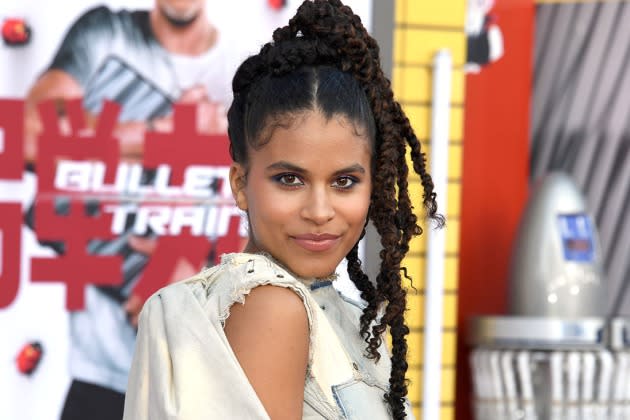
[The following story contains spoilers for Bullet Train.]
Bullet Train gave Zazie Beetz a series of firsts, including her first wig, her first return invitation and her first proper on-screen death.
More from The Hollywood Reporter
Events of the Week: 'Bullet Train,' 'A League of Their Own' and More
Hollywood Flashback: NBC's Pricey 'Supertrain' Took a Short-Lived Ride
After working with director David Leitch on Deadpool 2, Beetz gladly accepted his offer to reunite for a small yet memorable appearance as “The Hornet” in Bullet Train, which boasts Brad Pitt as the lead of a talented ensemble cast. It certainly didn’t hurt matters that Beetz’s scenes were mostly with Pitt, including an all-out brawl between their two assassin characters in a train car that marked Beetz’s first climactic death on screen.
“I’d definitely say that [Bullet Train] was my first big dramatic death, and I feel like it’s a rite of passage for an actor to have a good death. Most people are very excited to play a fun death, and that was actually my favorite bit to shoot where I crawled behind the bar and just went for it,” Beetz tells The Hollywood Reporter.
In 2019, there was a lot of debate surrounding Beetz’s Joker character, Sophie, and whether she truly met her end or not. Eventually, director Todd Phillips emphatically stated that she survived, as did the release of the “final shooting script,” which included a scene where Sophie watches Arthur Fleck (Joaquin Phoenix) commit murder on live television. But for Beetz, Sophie’s fate was never even a question.
“In my mind, she lives because she never actively wronged Arthur. His victims in the film were generally people that pointedly hurt him,” Beetz explains. “Even within the horror of his realization around his own state of mind, he acknowledges that she’s more of a bystander to his situation than an actor to his situation. So she makes it out unscathed, at least physically.”
With Ryan Reynolds now getting into Deadpool 3 shape, fans are wondering if Beetz will reprise her role as Domino in the Shawn Levy-directed threequel, but as expected, Beetz can offer very little on the subject.
“Well, I can’t, obviously, really say anything, but I feel lucky. I just can’t really divulge or say anything, so we’ll see, I suppose,” Beetz says with a laugh.
In a recent conversation with THR, Beetz also gets candid regarding the double standard that emerged from her Atlanta season three storyline, involving Van (Beetz) and Earn’s (Donald Glover) daughter, Lottie. Then she shares her reaction to the recent news that Joker: Folie à deux will be a musical.
So, what came first: The Hornet’s wig or the Amélie wig [from Atlanta]?
(Laughs.) Hornet’s wig, actually! That began my obsession. Now I’m a wig girl.
Did you like not recognizing yourself?
I love my hair, but I feel like I just do the same thing with it over and over again. So it’s just nice to switch it up in a noncommittal way. Hair and makeup really just allows you to transform in a tangible way that you can feel and see, and it really helps with character work. So I keep suggesting wigs now for everything because they’re just really fun, and it’s a quick way to make a shift. The Amélie wig has been the most fun one so far.
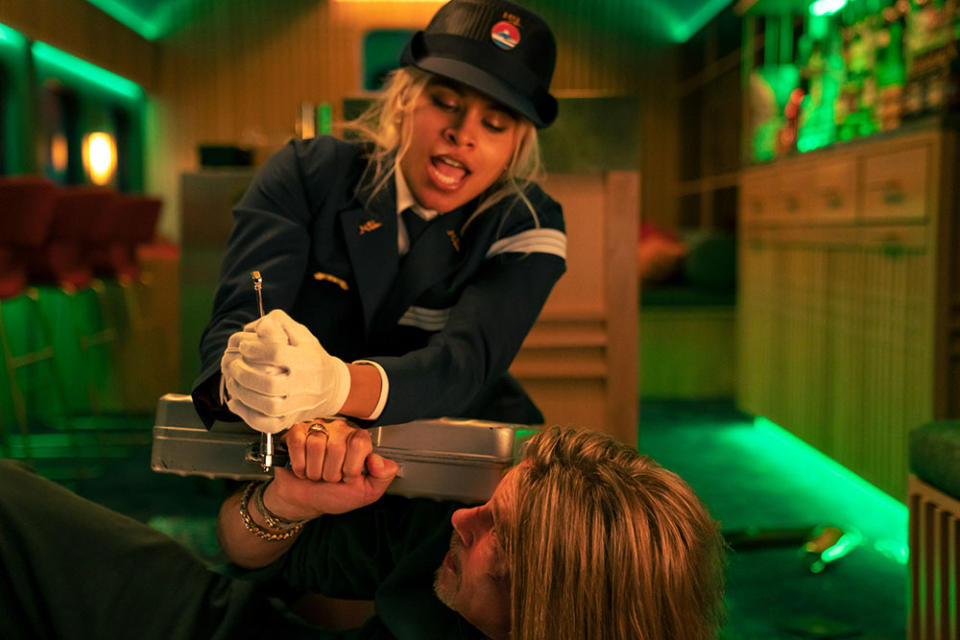
Actors often tell me that they get to know their co-stars very quickly through rehearsing fight scenes and then performing them. And that’s partially because they’re a bit awkward since there’s mutual sweating and all that.
Mm-hmm. (Laughs.)
Anyway, how does all that factor into a fight scene with one Brad Pitt?
I mean, I wasn’t mad at the headlocking, et cetera. (Laughs.) What’s nice about fight scenes is that when you meet new people, they immediately give you an activity to focus on and do, versus just small talk. Fight scenes give you something to jointly commiserate over or cheer over, if things go well or don’t. So it’s fun working with somebody like Brad and really realizing that there’s a reason why he is a star. He is just so kind and charming and just really talented. His improv and his instincts are just so good, and since I had such a quick in and out, it was definitely a fun treat to have my part in this film be mostly with him.
Did your Domino training come in handy for the Hornet?
Absolutely. My Domino training has, in general, been a huge foundation for any other stunt work I’ve done, but I’ve definitely lost whatever benefits I was reaping from actively working out at the time. Real fighting and even just basic training for anything is different than choreographed stunt movement. It’s essentially dancing. But David Leitch’s stunt team is really good at basic training, and they like to train from the ground up. And so from Deadpool 2, I really felt like I acquired this elementary basic range of motion and how to move, how to punch, how to kick in a stunt format. So that has served me well in any movie where I’ve had to do anything like that. It wasn’t the same stunt team this time, but the crew was the same as Deadpool 2. So it felt familiar in a way, and David is just so knowledgeable. It’s easy to work with him, which helps since stunt work can be such a technical and specific thing. He knows what he’s looking for as a director. So Deadpool was a huge foundational stunt boot camp for me.
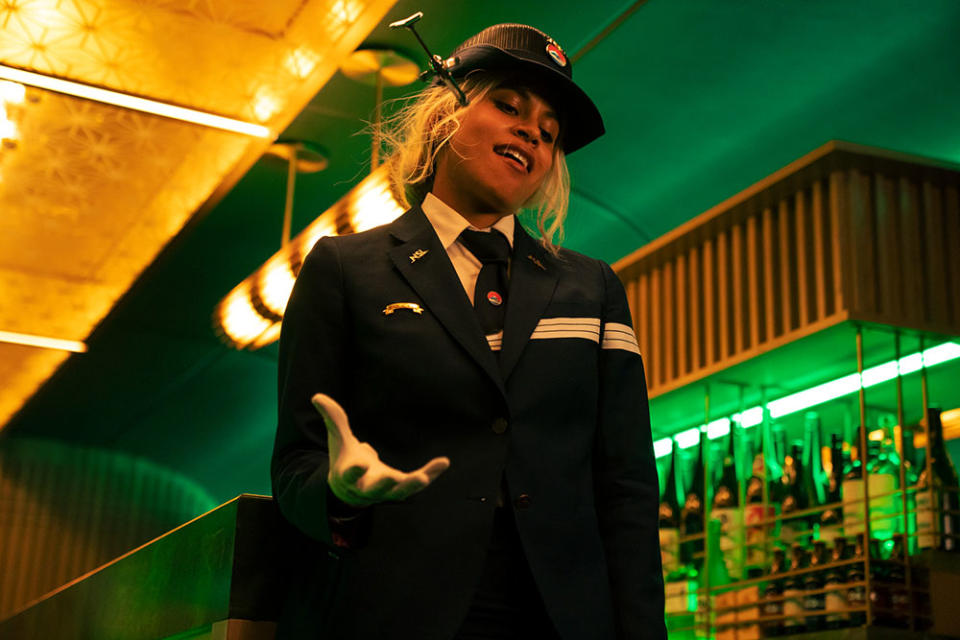
Was this the first return invitation you’ve ever received from a former director?
I think so, in an official way. I mean, I’ve worked with [Atlanta director] Hiro [Murai] multiple times, but Hiro hasn’t had much of an option around that. (Laughs.) But I was so happy to get on set with David again. He’s just a really relaxed person, particularly with such big budget movies. They can be very high pressure, and so it’s great to have a director who’s quite zen. Not much seems to shake his boots, and his energy trickles down to everybody and makes for a relaxed shooting environment. I’m down to work with Dave Leitch anytime.
Was Bullet Train also the first time you’ve actually died on screen?
I had one other death in an indie movie called Slice, which I shot in 2016. That was fun, but in some ways, that almost doesn’t count because I reincarnate as a ghost. But I’d definitely say that this was my first big dramatic death, and I feel like it’s a rite of passage for an actor to have a good death. Most people are very excited to play a fun death, and that was actually my favorite bit to shoot where I crawled behind the bar and just went for it.
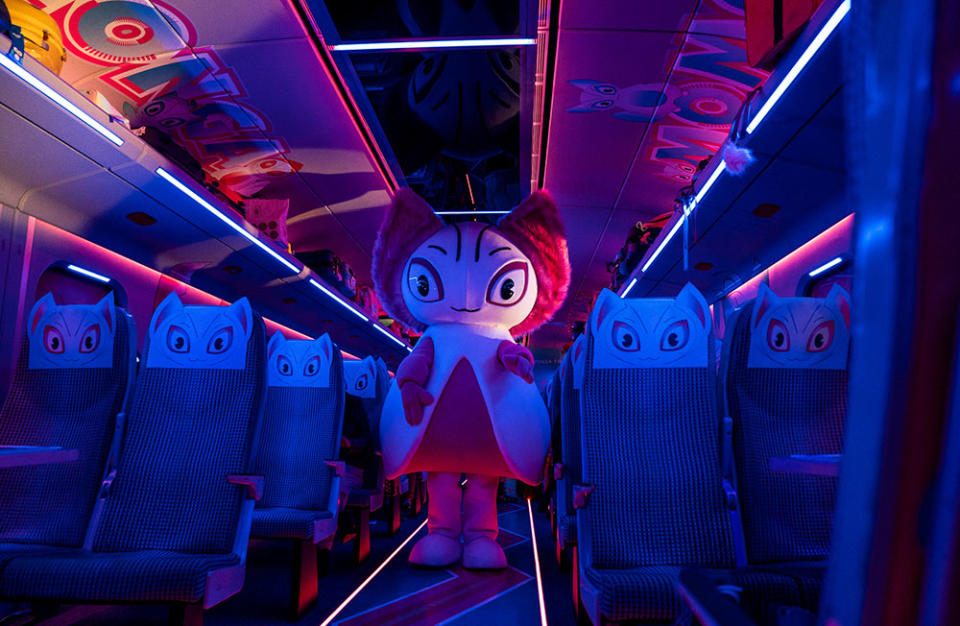
Did you actually get inside the big Momomon mascot costume?
I did! One of our stunt teams did most of the mascot work, but I was definitely in there for one of my days on set. It is hot and difficult to move in, so hats off to all the mascot workers around the world.
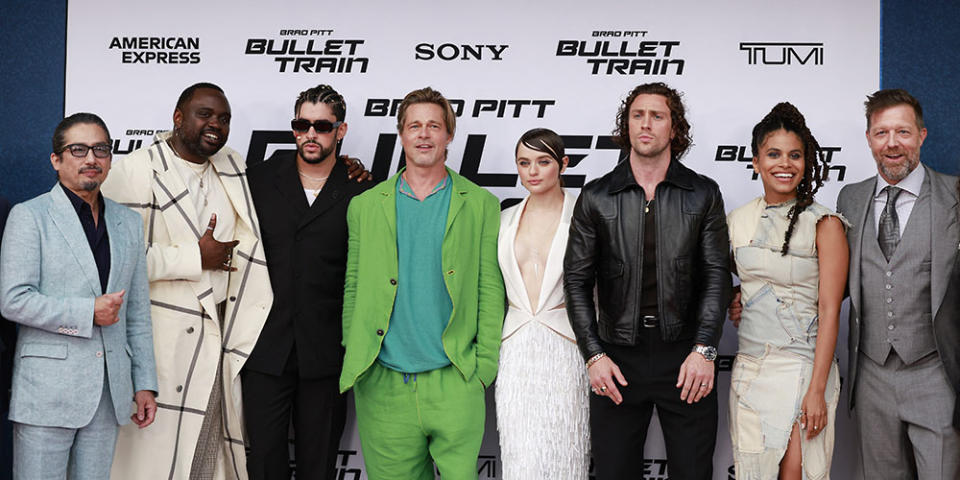
There’s a trend right now amongst original movies where they cast as many name actors as possible, and Bullet Train is an example of that, as is The Harder They Fall, Knives Out, Don’t Look Up, Oppenheimer. So do you get the sense that all-star casts are becoming the new “movie star”? Perhaps, original movies are taking a page out of the superhero team-up playbook.
It’s interesting because what a celebrity is, is kind of changing as well. The mega stars, like Brad Pitt or Tom Cruise, are fewer and farther between, and I think it’s because the way fame has shifted due to social media and the Internet. So I wonder if studios feel like they need more names in order to sell stuff. Bullet Train is perhaps a different example because I think Brad Pitt sells a lot of tickets, but I don’t think an all-star cast necessarily makes a movie better. It adds the pop element of everyone knowing that everybody’s in it, which makes it more colorful and funny in a way, but I hope that it doesn’t become the new norm in the film industry. Often, the most interesting movies are the ones that have new and interesting people who are exploring and whatnot, but I do see what you mean.
So do you enjoy pushing people into pools now [a la her Atlanta character, Van]?
(Laughs.) Yes, it’s my new summertime hobby. 2022 has been crazy, so why not match the energy?
As a little girl, when you imagined all the things you’d want to do on a TV or movie screen, assaulting someone with a French baguette probably wasn’t on the list.
(Laughs.) Definitely not, but I honestly feel so lucky to play a character so big and fun in that way. I don’t think that the film industry necessarily sees me in that kind of light, as somebody who can potentially do something a bit campy and fun. So I really relished that when I got to do the last episode of Atlanta [season three]. I found it to be one of my most enjoyable experiences on set. So I’m glad Donald [Glover], Hiro and all of them trusted me with it, but no, as a child, I definitely wasn’t envisioning baguette bashing in my future.
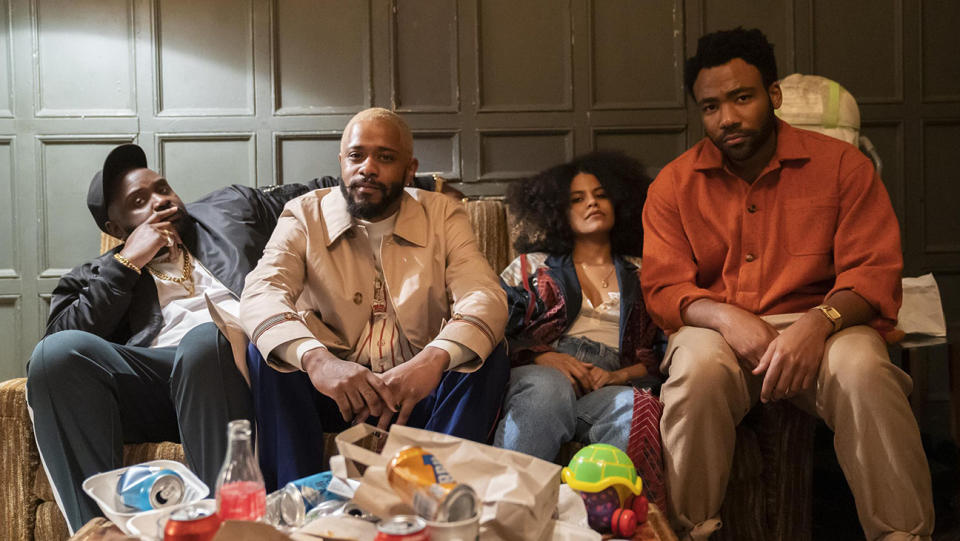
I’m so glad that episode happened because, with both Van and Earn in Europe, I couldn’t help but wonder about Lottie (Van and Earn’s daughter) the whole season. But then you delivered that impressive monologue, and it put Van’s entire season into proper context. So what did you make of the revelation that she was basically running from herself?
I’m sure most people can identify, to a degree, with trying to run from who you are, who you think you are, and then trying to figure out who you want to be. So I think it tracked very much with Van’s journey in general. She’s always struggled with not quite knowing which identity she fits into, be it as a mother or as a partner. Is she together with Earn [Donald Glover]? Is she not? As a provider, she wants to be stable, but she also wants to have fun and do her own thing. And then she feels judged or she faces consequences if she does. So it’s not really fair. It’s interesting because whenever Atlanta was referenced on my Instagram, most of the comments would say, “Why isn’t Van with her daughter? What’s going on? She needs to get back to her daughter.” But you don’t really see that with Earn, Donald’s character.
The audience holds that standard of, “You’re the mother. You are meant to be with your daughter,” but Earn can go do whatever he wants and not get demonized. So I think that’s a lot of pressure, and I think a lot of mothers feel that in general. With family care, there’s more pressure on women to do that, which is also a contributor to the pay gap because women are more likely to call off work in order to support their family. And I’ve even seen that within my own family. It’s generally the mothers who are the ones that need to step in for emergency care, and so I can understand feeling trapped by that. I’m not a mother, but I’m definitely a spirit that is noncommittal and dreams of far off places all the time. When I’m here, I want to be there, and when I’m there, I want to be somewhere totally different.
And so I think Van was written a little bit for me in that sense, as Donald, the writing team and all the producers have gotten to know me better. I also think it reflects some of Donald’s anxieties or insecurities, being a parent, an artist and a provider. So I felt very honored to have had that arc, and I’m so glad she had her moment to fully express herself. She inhabited everything at once, from her guilt and her love for her daughter to feeling trapped by her daughter and her freedom. She wanted to be there, but didn’t know how to balance all of those things, which I think is very natural. I think a lot of people go through that.
We talked a few years ago for Joker, and at the time, there was a lot of debate about Sophie’s fate. But since then, the so-called final shooting script was released during awards season, and Sophie definitely survived in the script, as she watched the talk show terror unfold on TV. So is that the outcome you have in your mind for Sophie, even if that scene wasn’t in the movie?
Yeah, in my mind, she lives because she never actively wronged Arthur. His victims in the film were generally people that pointedly hurt him. Even within the horror of his realization around his own state of mind, he acknowledges that she’s more of a bystander to his situation than an actor to his situation. So, to me, it made sense that she wouldn’t be harmed by him because his harm was intentional towards certain people and then society at large, which he also felt wronged by in a way. So in my mind, she makes it out unscathed, at least physically. (Laughs.)
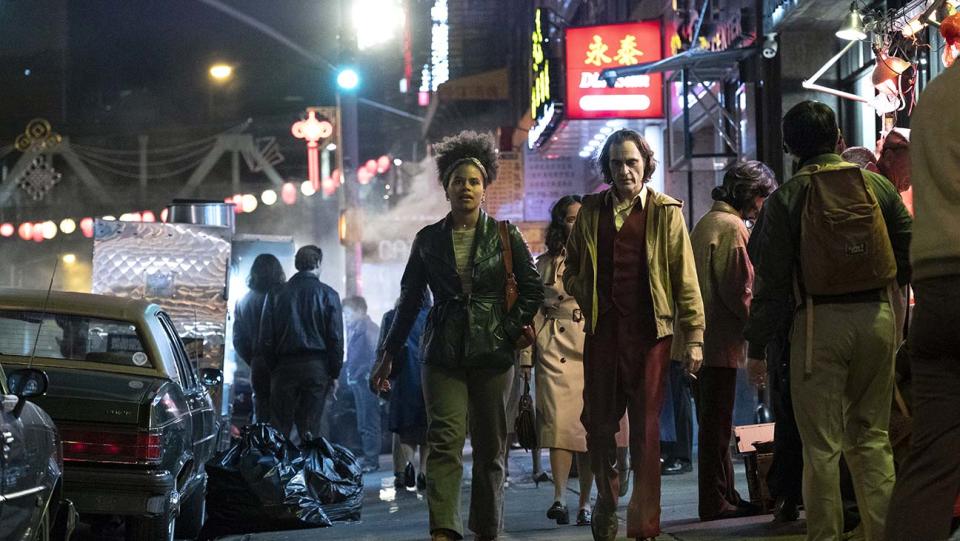
So Joker 2 is going to be a musical, and based on your experience with that creative team, were you like, “Oh, that makes sense”? Or were you like, “Wait, what?”
(Laughs.) I actually think it makes wonderful sense. I wasn’t really surprised by that. Todd [Phillips] has always had a creative approach to the character. I love musicals, and I think of them as the characters are feeling and experiencing so much that they can only sing and dance about it, whether in sorrow or in joy. And I can actually see that within myself as well, because singing and dancing is quite a cathartic experience for me. I was going through a really, really difficult time at one point in my life, and I just started dancing and crying by myself. And that was an expression that matched where I was at that moment. And so I can see Arthur, who is feeling and experiencing so much, dancing and singing about it. He’s the Joker, so I think it makes sense to me.
So how’s Domino [from Deadpool 2] doing, and is she feeling lucky about the future?
Well, I can’t, obviously, really say anything, but I feel lucky. I just can’t really divulge or say anything, so we’ll see, I suppose. (Laughs.)
I really dug Cathy Yan’s movie Dead Pigs, and she told me the whole New York backstory you guys share and how she wrote a small role for you at the last minute. But I also thought it was cool how you still helped promote the movie four or five years after shooting it.
I appreciate that. When you work on something and you do press, you’re really supporting the hundreds of people who did something together. So I was really proud of the work Cathy and my partner [David Rysdahl, who was recently cast in the aforementioned Oppenheimer] did in that movie, and I wanted people to see it. It’s such an interesting and cool movie.
Nine Days was also quite a movie. Did that experience change your perspective at all? I have to imagine that the material struck a chord in a way that’s unique from most projects.
I don’t know if Nine Days changed my perspective as much as it solidified my perspective in terms of the importance of presence and approaching the world with childlike wonder, which continues to exist everywhere. It solidified the importance of allowing the complexity of life’s emotions to all exist without one usurping the other. Joy and sadness can exist in the same space, and they both need acknowledgement. So the movie reaffirmed views I try to practice in the world, which is perhaps why I was drawn to the character, Emma.
But overall, I loved that Winston Duke played Will, and since I love stories in general around mental health, I loved the idea of exploring a Black man in mental health, even if it wasn’t actively in the narrative. It was nice to see people who resonated with Winston and who looked like Winston, being like, “Oh my gosh, that’s me.” And also being able to share another movie with David just makes it special, so I found that movie to be quite life affirming. I try to approach life with a general sense of optimism, and it made me feel more of that.
***
Bullet Train is now playing in movie theaters. This interview was edited for length and clarity.
Best of The Hollywood Reporter

 Yahoo News
Yahoo News 
